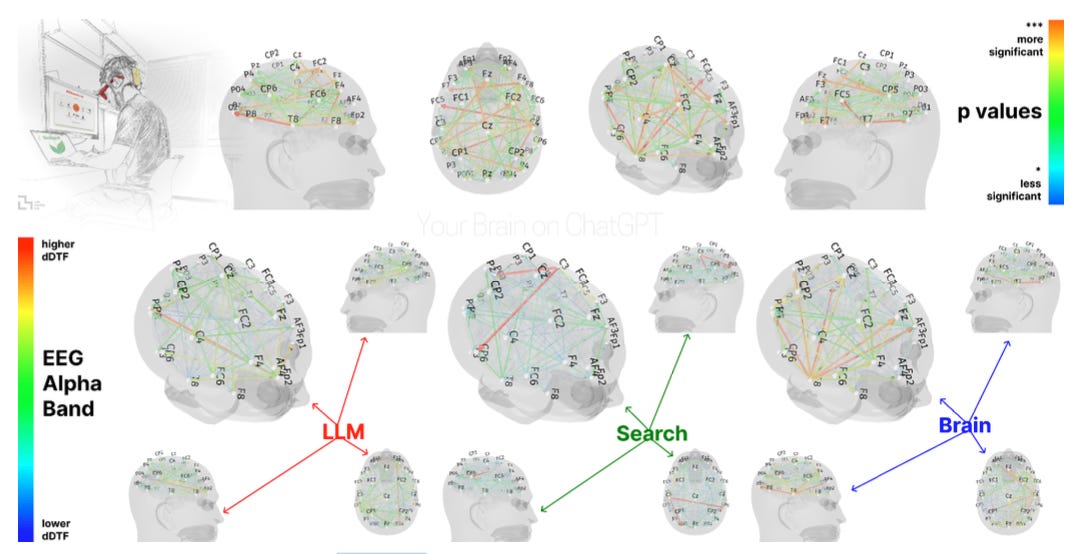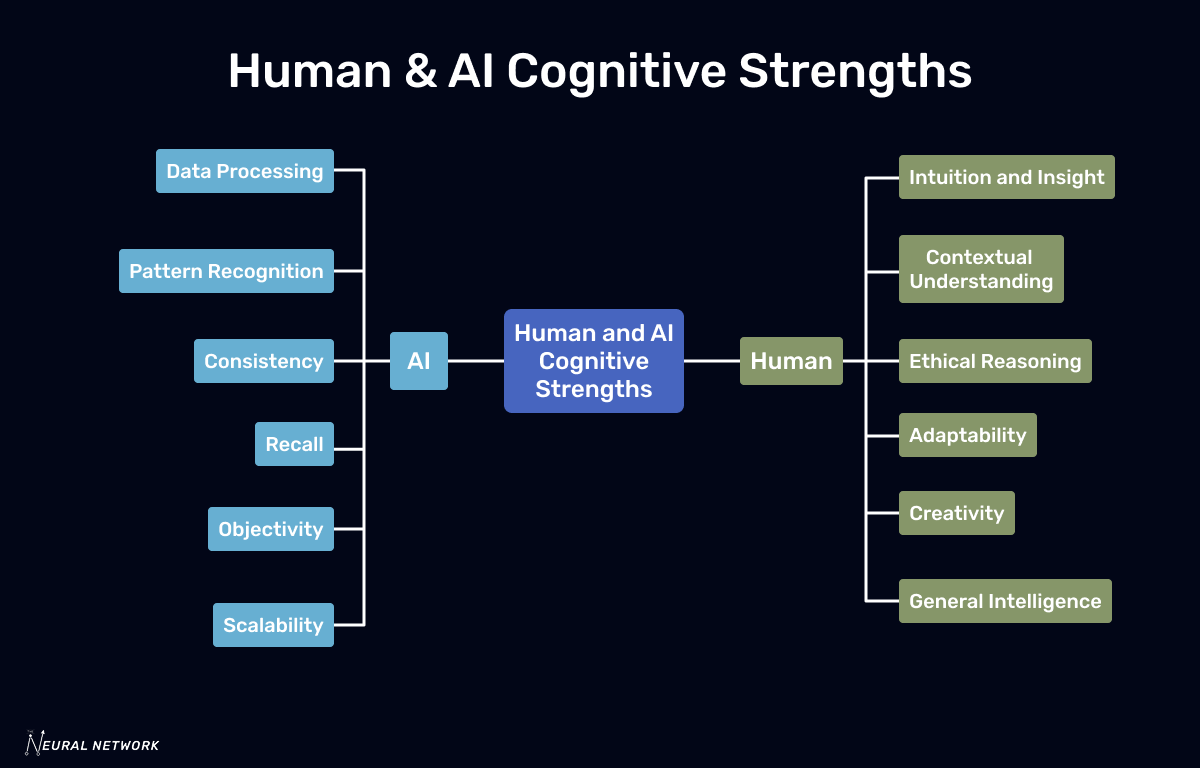Your Brain on ChatGPT Isn’t Broken
Cognitive Debt or Cognitive Leverage? It’s Up to You
Scroll through your feed and you’ll see it: headlines claiming ChatGPT is turning our brains to mush. An MIT study with catchy EEG scans is making the rounds — fifty-four students, three writing conditions, squiggly brainwaves. The big takeaway everyone loves? Using an AI assistant makes you think less, remember less, and maybe even learn less.
That panic sells. But it’s incomplete.
I’ve spent years building and scaling systems at the intersection of semiconductors, AI, and human decision-making. If there’s one thing I know, it’s this: cognitive offloading is not cognitive erosion. The real story is how we use the brain cycles we free up.
The Real Finding
The MIT Media Lab ran a straightforward experiment. Students wrote SAT-style essays while EEGs tracked their brain activity. One group used ChatGPT. Another used Google Search. The last went solo with no tools, just a blank doc and a deadline.
The results? The LLM group wrote 60% faster but showed weaker neural connectivity in regions linked to memory and semantic processing. In plain terms, ChatGPT took on some of the mental heavy lifting.
Cue the headlines: “AI Makes You Dumb.” But that’s only half the story.
Cognitive Offloading Is Nothing New
When people talk about AI “offloading” our thinking, they act like it’s new. It’s not. Our brains have always outsourced routine tasks so we can tackle the complex. It’s how we stay sane in an overwhelming world.
Psychologists Risko and Gilbert gave us the term cognitive offloading. It happens every time you jot down a grocery list instead of memorizing it, add an appointment to Google Calendar, or look up an API call instead of storing it in your head.
It’s the same with calculators, notepads, or chatbots. You hand off the grunt work so your brain can focus on higher-value tasks. And it works. You don’t know as many phone numbers as your grandparents did, but those neurons are busy with more interesting problems.
The spreadsheet didn’t kill math; it scaled it. GPS didn’t erase our sense of direction. It freed us to decide whether we even want to go there.
Efficiency Needs Reinforcement
What the MIT study really shows is that ChatGPT reduces germane cognitive load — the mental strain required for routine processing. It didn’t show that students’ ability to think critically vanished forever.
Offloading only becomes a liability if you squander the surplus.
Look around: spreadsheets made accountants better at forecasting. CAD made architects bolder with design. Generative AI can do the same for writers, analysts, and strategists. But you still have to steer. You still have to ask: Now that my brain isn’t buried in drudgery, what will I do with that space?
System Design Is the Real Risk
The danger isn’t ChatGPT. It’s accepting every bland draft it spits out and never asking better questions. That’s not the AI’s fault; it’s on us, our workflows, and how we design for critical engagement.
This fear cycle isn’t new. Plato worried that writing would erode wisdom. People panicked that calculators would destroy mental arithmetic. Now it’s AI’s turn. And yet every time, we adapt if we push our minds up the value chain.
Sam Altman once joked that a subsistence farmer from a thousand years ago would think our desk jobs are fake. Now we’re using AI to automate parts of those “fake” jobs so we can find something real again. What matters is how we spend the cognitive bandwidth we reclaim.
Offload Wisely to Stay Ahead
Brains are like muscles: use them or lose them. The MIT scans don’t show AI eroding our capacity to think; they show it lowers the mental effort for routine tasks. That’s not erosion. That’s leverage.
But leverage only works if you reinvest it in something that matters.
Look at business. A junior analyst who uses AI to draft a market report faster adds no value if they just rubber-stamp the output. But if they spend that saved time stress-testing assumptions, hunting for insights, or talking to customers, they’re working at a higher level.
The same principle scales up. An executive team can use AI to polish board slides, but the real upside comes when they use the time gained to debate what the numbers mean, which bets to place, and how to pivot before competitors do.
Good businesses push people up the cognitive stack. They offload what’s routine so minds focus on judgment, strategy, and decisions that move the needle. If you don’t do this, you’re just trading manual work for mindless output.
Use ChatGPT for the boilerplate — the rough draft and tedious tweaks. Then put that margin to work: validate ideas, test conclusions, ask the questions no prompt will ever generate. That’s how you build real leverage and keep your mind sharp.
The companies that get this right won’t just avoid “cognitive debt.” They’ll build teams where everyone climbs the value chain instead of staying stuck at the bottom because it feels safe.
Build a Better Brain with AI
When people ask if AI will make us dumber, I say they’re asking the wrong question. AI shifts where we spend our limited mental effort. Used well, it buys time for what really matters. Used poorly, it turns you into a copy-paste drone.
Cognitive offloading is the oldest productivity hack humans know. The printing press didn’t shrink our brains; it multiplied them. Google didn’t kill curiosity; it connected it. ChatGPT won’t kill thinking either unless we stop using what we save.
Your brain on ChatGPT is your brain on leverage. The tool won’t rot your neurons. Failing to reinvest them will.
Offload what’s repeatable. Reinvest in what’s irreplaceable. The future belongs to those who choose that discipline and build systems that make it second nature.





